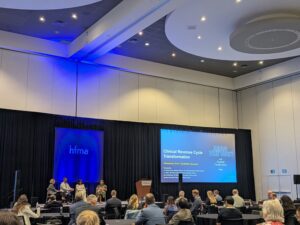Maybe I’ve just been to too many conferences, but you can tell when you’re in a room with a panel of true experts. You hear it in the way they talk and those who attend. This was what I saw when I attended the “Clinical Revenue Cycle Transformation: Takeaways from 3 Systems” session hosted by Accuity at the HFMA Annual conference. Check out the incredible group of panelists:
- Shelley Clyne, MD MPH from Mass General Brigham
- J.J. Melin from MultiCare Health System
- Anne E. Robertucci from Prisma Health
- Candice Daszewski from Accuity
I was able to share some of the key insights and perspectives they shared during the panel on social media which you can also find below along with some additional commentary.
Does RCM need a transformation? I think that’s an open question. What doesn’t seem like an open question to me is that RCM is going to be transformed with technology. What do you think?
JJ Melin was the star of this panel for me. He wasn’t afraid to state it just how it is for him and his organization along with some really impressively dry humor. In this case, he highlighted what everyone was talking about at HFMA. Their organizations are growing, but the mandate from healthcare leaders is to contain costs. That’s a tough thing to balance for any leader.
If you’re someone working on an RCM related product in healthcare, you better be looking at improving net revenue. If you’re not, then from the perspective of this panel, you’re probably in trouble. That’s the biggest priority for them.
Many provider organizations don’t realize the power that they yield. Plus, some are afraid of how it will impact patients. However, the hard reality is that it’s important for providers to hold payers that are acting badly accountable. Otherwise, nothing will ever change. However, they acknowledged that once addressed, payers will often change quickly to keep your business.
Balance in life, work, and RCM is always a challenge. Kudos to Accuity and the others on the panel for providing a list of key areas of focus they think are important for a healthcare organization. DRG downgrades were a hot topic at the conference, but I didn’t hear many solutions.
This was probably my favorite line of the session. It reminds me of the famous line that busy doesn’t mean effective. Plus, what you measure matters.
Kudos to Dr. Clyne for pointing out that queries is the wrong metric. It may be called a vanity metric. She suggested that higher CMI and less queries would be a much better outcome.
There’s definitely an evolution happening and AI and CDI are going to have a fun time dancing together. They’re actually complimentary to each other, but it’s going to be a bit of a bumpy road to get there. AI isn’t better than a human for many things yet, but that’s changing quickly. Is the culture of our organization ready to accept change?
Possibly the best advice you could get when it comes to AI and CDI. AI is going to make it appreciably better, but don’t get distracted. Focus on your KPIs and you’ll know if the tool is the right one or not.
This comment from Robertucci was eye opening. She’s right that innovation is needed because of the workforce shortage that exists in healthcare and specifically in CDI and RCM. We can’t apply more humans to the problem. I also love the acknowledment that another way to address the workforce shortage is working with vendors in the space. I see this happen a lot with great results if you choose the right partner.
Want to see what the futurel of CDI within RCM looks like? Check out the list from the panel above. Do you agree or disagree with the list? What would you add?
In the discussion of AI medical scribes, it was great to hear the RCM and CDI perspective. Robertucci highlighted how this change in how RCM and CDI are done is essential to being able to relieve the burden from providers. It needs to happen at the point of care and that seems like the opportunity that many AI medical scribes are offering or working towards.
This is a big problem in healthcare and a major source of burnout. What’s the solution? I think the answer is going to be technology that takes the documentation burden off the doctor so they can do what they were trained to do. As one speaker said, a doctor isn’t trained to document for reimbursement and yet that’s what they’re required to do today. However, it is changing.
The panel was quite bullish on what was happening with AI Medical Scribes/ambient clinical voice documentation. However, they did acknowledge that it’s only going so far right now. For example, they weren’t even looking at DRGs.
I always love when a session has a great takeaway slide like the one above. Nice job Accuity for putting this together and leading this panel of Clinical Revenue Cycle experts at HFMA.
What do you think of the above takeaways? Anything you’d remove or add? Let us know on social media.



